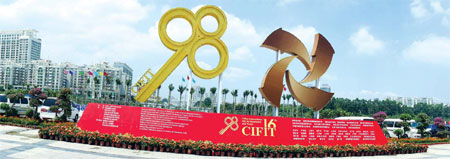Officials confident about FDI
|
A view of the venue that will host the 16th China International Fair for Investment and Trade on Saturday. Zou Zhongpin / China Daily |
Reshoring activity has 'limited' effect on investment
Officials at the Ministry of Commerce said that China remains a strong and attractive market for foreign investors, despite reports that growing numbers of international companies, particularly manufacturers, have been considering pulling out of the market, as their own economies suffer.
Shen Danyang, the ministry spokesman, told a news conference before the start of the 16th China International Fair for Investment and Trade, being held in Xiamen, Fujian province, from Sept 8 to 11, that some developed economies have already been encouraging their own organizations to consider reinvesting, or "reshoring" back in their own markets, as a boost to their own struggling sectors.
The United States launched its own official Reshoring Initiative in 2010, and according to one recent survey, as many as 39 percent of companies operating abroad were reported to be considering moving some manufacturing back to the US.
While this kind of policy could have an effect on China, Shen said that the ministry considers it to be "limited" and that the country still remains attractive to foreign direct investment in the medium and long term.
"Growing efforts by the United States and the European Union to boost their own domestic manufacturing sectors will surely have some impact on Chinese attractiveness of FDI.
"But that will be limited, owing to the differences in industrial structures between China and the US and countries in the EU, and the manufactured products in question," he said.
Sang Baichuan, director of the Institute of International Business at the University of International Business and Economics in Beijing, disagreed.
Sang said that this "reindustrialization" of some developed economies will more likely lure back companies involved, for instance, in IT or innovation, best-suited to creating jobs at home, with businesses involved in more labor-intensive industries still happy to keep their investments in China.
"This will affect China's industrial upgrading and ongoing economic restructuring in addition to reducing FDI flowing into China.
"The reshoring of manufacturing has started to take effect, so the government must take immediate measures to optimize the business environment and reduce investment costs," Sang added.
In Asia, South Korea announced policies in April aimed at enticing more of its companies to come home and invest.
A group of 14 South Korean jewelry and accessory companies pulled out of Qingdao in eastern China in late August, for instance, the first time any companies from the country had jointly pulled out of investments in China.
The companies concerned blamed the worsening business environment in China, including rising costs and the appreciation of the yuan, as well as the favorable incentives being offered in South Korea, helped by free trade agreements which came into force with the US and the EU in 2011, according to a report in Korea JoongAng Daily.
Wang Haifeng, director of international economics at the Institute for International Economic Research, which is affiliated to the National Development and Reform Commission, agreed with Shen, and said that he too considers any trend by foreign firms to return home as "temporary".
Foreign direct investment in China declined 8.7 percent in July from a year earlier to $7.58 billion, the eighth drop in nine months and the smallest inflow since July 2010, according to the ministry.
But Shen emphasized that Chinese manufacturing attracted 45.2 percent of FDI from January to July, which is almost the same as previous years, showing that there has been no significant capital withdrawal from Chinese manufacturing for the time being.
"In the medium and long term, China still retains competitiveness in attracting FDI," Shen said.
"Despite rising operating costs, which are actually relatively low compared with developed economies, China has a huge domestic market and a well-developed industrial structure as well as a labor supply which is rising in quality."
A survey by the United Nations Conference on Trade and Development showed that China was ranked as the most attractive investment destination by transnational companies from 2012 to 2014.
"Even with the world economic situation, 15,000 businessmen from 120 countries or regions are expected to attend the 16th CIFIT, more than any year, which also shows that foreign investors are still confident in China," Shen said.
lijiabao@chinadaily.com.cn



















